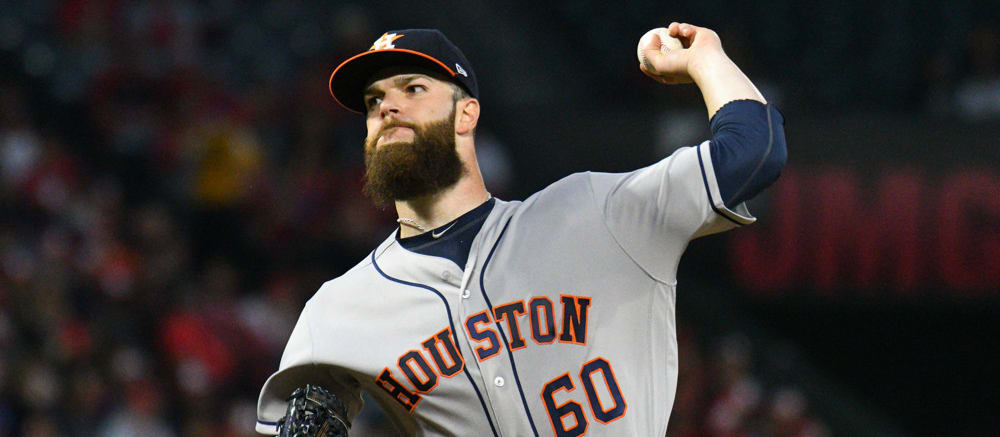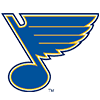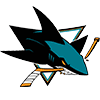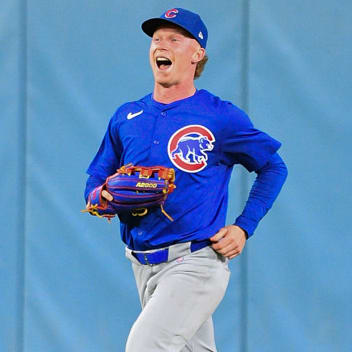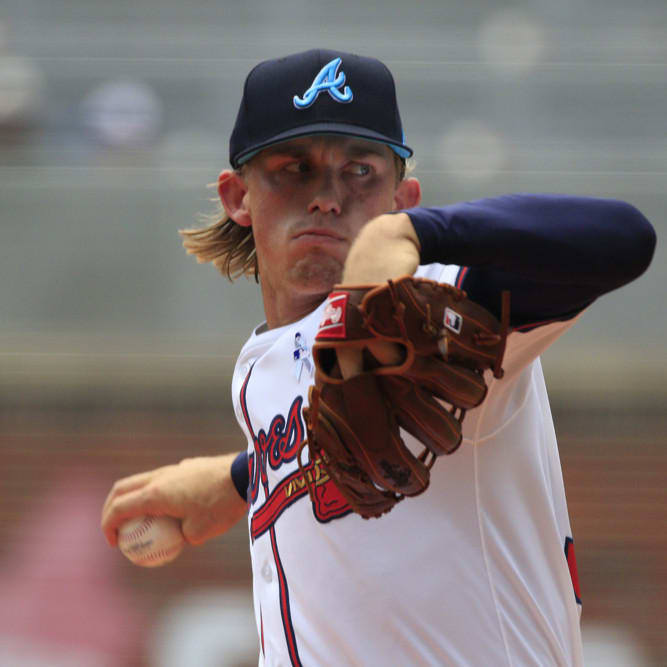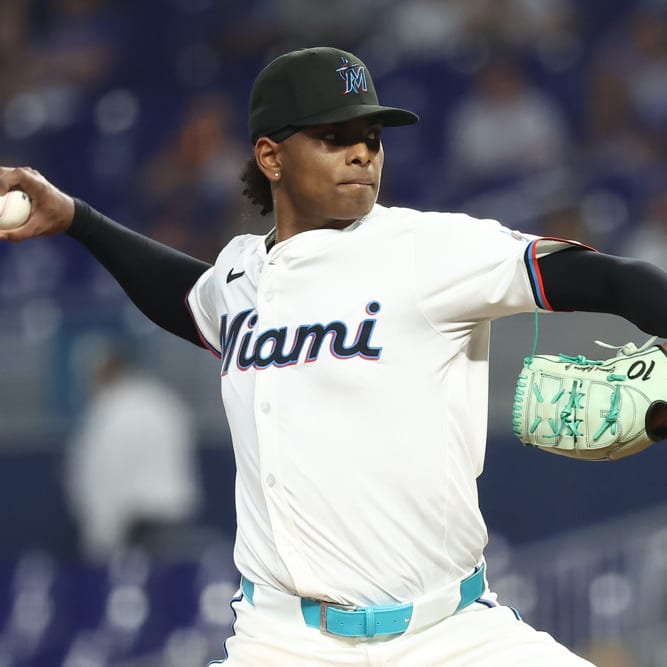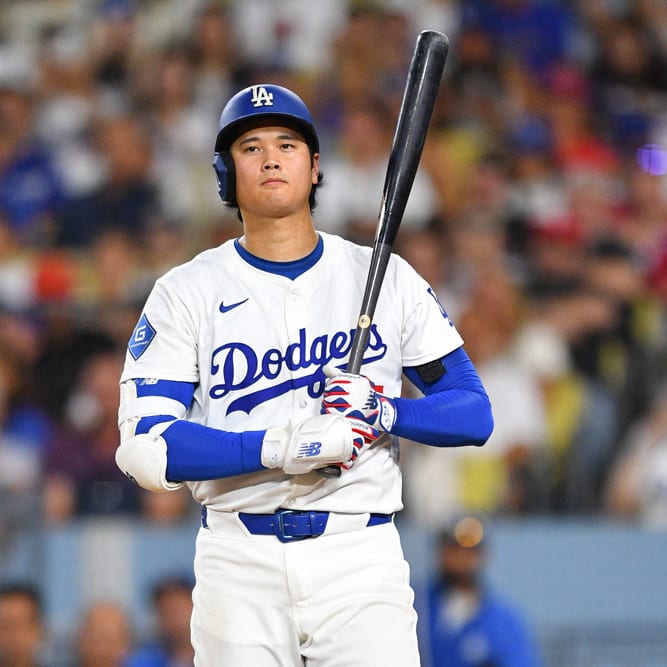There are two slate options Tuesday, with the classic two-game slate available on DraftKings, along with Showdown contests for each game.
This article will attempt to help you with a variety of approaches to both contests.
The Matchups
Boston at Houston, Nathan Eovaldi vs. Dallas Keuchel, 4:09 p.m. EDT
Milwaukee at Los Angeles, Gio Gonzalez vs. Rich Hill, 8:09 p.m. EDT
The Astros are slight home favorites (-130) with an over/under of 8.5.
The Dodgers are slightly bigger home favorites (-150) with an over/under of 7.5.
Pitching
Rich Hill, LAD vs. MIL ($8,300) - As the most expensive home favorite on the board, Hill is probably the safest arm of the bunch, but the margins are small. Walks are generally his undoing on a bad day, but he had a 37:5 K:BB over 30 innings in September (3.90 ERA) with one poor control outing on the road against St. Louis (he won anyway that day). In his lone NLDS appearance against the Braves, Hill gave up two runs on four hits over 4.1 innings with three strikeouts and five walks. The Brewers were only a tick below average against left-handed pitching this season (98 wRC+), and it will be interesting to see how much the lineup differs from the group that Milwaukee started with in Game 1 of the series, which featured Hernan Perez in the No. 5 spot, Travis Shaw on the bench and Manny Pina behind the plate. As for Hill, he's capable of going more than five, but it's a tough ask for a pitcher leaning so heavily on two offerings – a fastball averaging 89.3 mph and a big curveball – with the former generating a higher whiff rate (27.3 percent) this season than the latter (21.1 percent). My expectation is that Hill be the second-most popular arm of the four pitching Tuesday in terms of ownership rate.
Nathan Eovaldi, BOS at HOU ($7,500) - After an ugly August, Eovaldi settled down during the final month of the regular season (1.35 ERA, 27:8 K:BB in 20 innings) and rolled through seven innings with a big lead in the Red Sox's 16-1 win over the Yankees in Game 3 of the ALDS. His step forward this season has been tied to an increased use of a cutter (32.5 percent use, .316 wOBA against), which has been accompanied by a spike in whiffs with his fastball (24.2 percent whiff rate, 39.8 percent usage). Many lineups will try to avoid having two pitchers in the same game, so the ownership rate on Eovaldi should check in lower than that of Dallas Keuchel and Rich Hill as the two home favorites without clear innings restrictions. Relatively speaking, Eovaldi becomes a slightly more interesting tournament play as a result.
Dallas Keuchel, HOU vs. BOS ($6,900) - While Keuchel has less strikeout upside most nights than Hill, the $1,400 savings and his status as a home favorite should leave him with the highest ownership rate of the pitchers in play for the Classic format. Keuchel might have the longest leash of the starters pitching Tuesday as well, which gives him a slightly better points floor than the pack. If you're the type who plays cash-game contests on a two-person slate, you'll be using Keuchel as a building block at this price. The optimal tournament combo is paying up for Hill and pairing him with Eovaldi.
Gio Gonzalez, MIL at LAD ($6,100) - The Brewers used Gonzalez to start Game 1 of the NLCS, and he was removed after two innings as manager Craig Counsell leaned on Brandon Woodruff for a pair of frames with the Dodgers having their preferred starting lineup for a left-handed starter on the field. Tactically, the move paid off, as Gonzalez allowed just one run and Woodruff delivered two scoreless frames and a solo homer against Clayton Kershaw before Josh Hader fired three scoreless innings of his own. It will be interesting to see if Dodgers manager Dave Roberts adjusts his starting lineup to account for the expected early exit of Gio Gonzalez, since he'll either give up favorable matchups the second (and possibly the third) time through the order, or burn through his bench early in the game if he follows the Game 1 script and the Dodgers are unable to get on the board early against Gonzalez. The Brewers used Hader to finish the eighth inning in Game 3, so he should be available in some capacity (likely two innings or less) in Game 4. Woodruff and Corbin Burnes are long-relief options capable of going longer if needed, which could effectively take some of the pressure off the short relievers, who have been vulnerable in their late-inning matchups during the series.
The main takeaway is that it would be surprising if Gonzalez is used to go through the order more than once since a parade of right-handed hitters will probably greet him in the first four spots. Any use of Gonzalez would have to assume the Milwaukee offense builds a significant early lead against Rich Hill, and subsequently, makes Counsell comfortable letting Gonzalez go through the order twice in an effort to preserve arms for Game 5. Build with the requisite Milwaukee stack if you're considering this path in a GPP. This is an extreme strategy, to put it mildly. One other angle to consider is to take a chance on Woodruff ($5,800), Corbin Burnes ($5,000) or Josh Hader ($4,000) in hopes of a multi-inning effort behind Gonzalez. Fading the starting pitching entirely opens up a lot of interesting combos, including a potential game stack of the Red Sox-Astros matchup.
Hitting
Generally, this should be a fairly easy double-stack arrangement where you avoid using hitters from the two teams facing your two starting pitchers. It gets a bit messy, however, because the prices on most high-end bats is elevated despite the limited number of options.
If you're playing it safe (cash-game lineups) with the Hill-Keuchel combo, you're left to pile up bats from the Dodgers and Red Sox.
The best value in the Los Angeles lineup likely will be Austin Barnes for $3,300, because he'll open up some much-needed salary cap flexibility elsewhere. Given the defensive struggles of Yasmani Grandal, Barnes has a good chance to play the entire game Tuesday. If Yasiel Puig starts ($4,200), putting together a bottom-of-the-order, or a wrap-around 7-8-1-2 stack might be possible, giving you an early matchup edge (righty vs. lefty) with Chris Taylor ($4,800) and Justin Turner (also $4,800) as key pieces in prominent batting order positions.
For Houston, the status of Marwin Gonzalez ($3,800) is worth monitoring, as he's either a cheap option eligible at shortstop and in the outfield, or he'll open up a path for a player like Tony Kemp ($3,300) or Tyler White ($3,600). An 8-9-1-2-3 stack here becomes possible, depending on how the bottom of the order is assembled, thanks to low prices on Brian McCann ($3,400) and Kemp (if he's starting and rounding out the order), it's easy to include George Springer ($5,000), Jose Altuve ($4,800) and Alex Bregman ($5,200) at the top. Bregman's eligibility at shortstop and third base offers nice flexibility as well.
For those building around Red Sox, Steve Pearce remains underpriced for his role and overall production against lefties ($4,200), while Eduardo Nunez ($3,300, with 2B/3B eligibility) and Christian Vazquez offer the greatest savings.
The previously mentioned Brewers stack, requires something different, like rolling with one of their relievers along with your favorite starter in the ALCS matchup, or even considering two Milwaukee relievers (again, an extreme GPP strategy) and hoping you'll find five innings, a win, and a lot of strikeouts for less than $10K, and leave yourself the freedom to make combos of bats from all but the Dodgers' lineup.
If you're here for a bargain Brewer, Orlando Arcia ($3,200) is your guy, even though he'll likely be hitting eighth in the order again Tuesday. Hernan Perez ($3,700) is a close second, especially if he's deployed from the fifth spot again.
Showdown Thoughts
There are a few changes to the scoring system in the Showdown slates. Hitters are rewarded for sacrifice flies and sacrifice hits, which is not the case in the Classic format.
The bigger differences come with pitching, where multi-inning relievers can become useful plays in certain scenarios, since holds and saves are rewarded, and reliever innings are worth 3.9 points (1.3 points per out) compared to starting pitchers' standard 2.25 points (0.75 points per out). Reliever strikeouts also receive a bump, earning three points each compared to the usual two for starting pitchers.
There is also an extra bonus for a 10-strikeout game (two points for 10-plus Ks), but that is increasingly difficult to find with the heavier bullpen use by most managers during the postseason.
The Showdown game for Tuesday is the later of the two matchups (Brewers/Dodgers).
Gio Gonzalez is pretty much impossible to use at $12,500 (25 percent of the $50,000 salary cap).
Reliever bonuses (and more affordable prices) will steer more rosters toward using them, but unfortunately, Brandon Woodruff is not in the player pool in the Showdown.
Hader at $3,500 is a steal. I expect that he'll be very highly owned, but it's enough of a discount where it worth eating the chalk and playing him anyway. Doing this leaves $9,300/player for the remaining five lineup slots. Be willing to leave some money on the table if you're expecting a short start or a poor outing overall from Rich Hill, but he can fit into lineup builds that include Hader, since you're getting a shot at a win from either side without ponying up cash for two starters.
If you're expecting the Dodgers to win, Kenley Jansen for a save could lead you to 10-plus points for $3,200, even if he's delivering a one-strikeout scoreless frame to end it.
Lorenzo Cain at $6,400 is a really odd player. He's priced at a level where he's really difficult to fade, but stacking him with Arcia and Yelich (8-1-2) should leave you with a trio of bats who will play all nine innings, and allow you to construct the remaining three spots of your lineup with plenty of cap space.
As value hitters go, Hernan Perez ($5,200) stands out as well (if he's hitting fifth), as does Orlando Arcia ($4,4700). Yasiel Puig ($6,000) and Austin Barnes ($4,800) are the cheapest bats on my radar from the Dodgers side. Generally, this group will be one-off plays or mini-stack pieces used to offset salary and fulfill the requirement of using at least one player from each team in the matchup.


